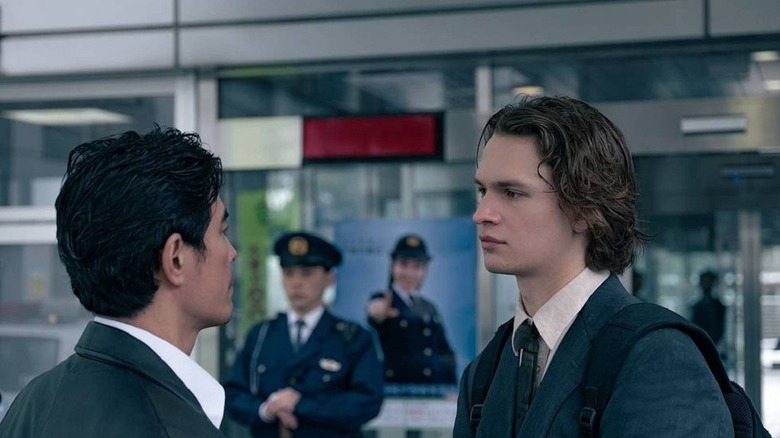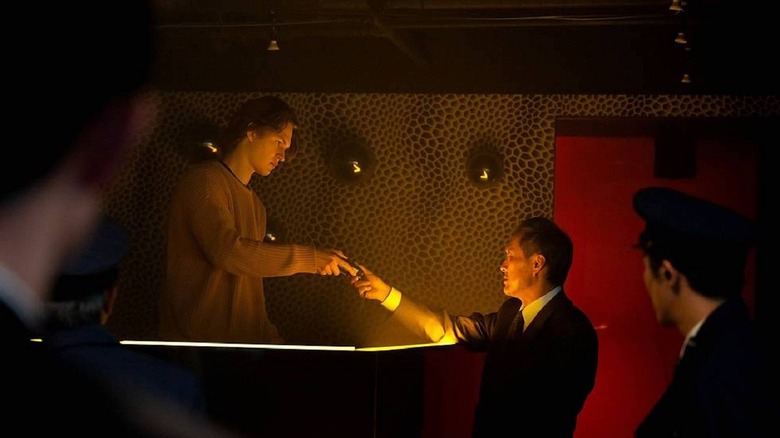Tokyo Vice Review: A Moody Thriller Saddled By The Elgort Of It All
There's a challenge inherent in hiring a famous director to helm the first episode of a TV series, whether it's potentially just a limited series or has the legs to run for years on end. If the director has been brought in, they're likely there to bring their distinctive style to the small screen — a style that could be unique enough that it poses an obstacle for those who direct future episodes. Can you just replicate someone else's style? The new HBO Max drama "Tokyo Vice" finds itself at a particularly tough flashpoint by the end of its pilot episode, because like many prestige shows, it's got a big name behind the camera: none other than Michael Mann of "Heat," "Collateral," "The Insider," and, oh yes, "Miami Vice," both the TV show and the cult favorite film. So, a beloved filmmaker and working within a genre that he's handled plenty of times before. But while the title of "Tokyo Vice" implies thematic similarities, the show rarely ever hits the heights of its opening episode. Surprisingly, it's less because of who's behind (or not behind) the camera, and more because of the central figure on screen.
Yes, as the headline and photo of this review make clear, the ostensible lead of "Tokyo Vice" is Ansel Elgort as real-life journalist Jake Adelstein, whose book of the same name serves as the source material. Elgort is, depending on how you look at it, riding high after having starred in Steven Spielberg's superlative "West Side Story" remake, or he's becoming something of a persona non grata in the industry after having sexual-assault allegations levied at him over the last couple years. Even if you are able to sidestep the latter, or ignore them, there's a different issue at the core of "Tokyo Vice," which is that Elgort makes for a very dull and uninvolving lead actor here. When the show begins (after an in medias res opening) in 1999, Jake is already well ensconced in Tokyo, having moved from his home state of Missouri. While he has quickly fallen in love with Tokyo's culture, he has a very specific goal: becoming a journalist, despite the general hurdle of ... well, being a white American. But by the end of the opening episode, Jake has achieved that goal and tries to establish himself as a serious reporter, getting enmeshed in the middle of a burgeoning war between rival yakuza factions, along with a world-weary cop (Ken Watanabe).
The limited scope of the opening hour (out of the five episodes made available to critics), which is very heavily focused on Jake, makes the next few hours feel both more open in their storytelling breadth and also highlights how Jake is vastly less interesting as a character than those around him, even as he begins investigating a suicide that may be a hint of a larger conspiracy encircling the corporate and criminal worlds of Japan. Watanabe's Hiroto Katagiri — sadly in very little of the Mann-directed opener — is a careful and sly detective, a character bolstered strongly by the cagey way that the actor brings him to life. And there's Rachel Keller as Samantha, a fellow American ex-pat like Jake, but one whose life shifted dramatically upon moving to Tokyo, where she works as a red-light district hostess with ambitions of starting her own nightclub. Show Kasamatsu stands out among the larger ensemble, as Sato, a young yakuza who connects with both Jake and Samantha, and struggles with his allegiances to the violent underworld hovering throughout Tokyo.
A dull central focus
The ensemble cast ends up getting much more to do over the course of the episodes following the first one, which only throws into sharper relief the reality that Elgort is the odd man out. It's not just that Elgort's performance is weak relative to the rest of the ensemble, though that can't be ignored. In the excellent "West Side Story," Elgort's flatness as a performer felt like an appropriate fit to the bland, Romeo-esque romantic archetype he embodied. (And in the muscular action comedy "Baby Driver," Elgort was used well by writer/director Edgar Wright as more of a vessel for propulsive action than deep emotion or thought.)
But in "Tokyo Vice," Jake Adelstein is meant to be both shrewd enough to spot a grander conspiracy that goes beyond even a string of mysterious deaths that most Japanese cops refuse to explore as murders (even in the case of one where a man was clearly stabbed), and yet naive enough to realize too late that his investigation may create heartbreaking collateral damage. In short, Jake is meant to be a fairly three-dimensional character, but one who reads as a lot more uninvolving due to his performer. It shouldn't be quite so enjoyable to watch Jake, in a mid-season episode, get thrashed about a bit during a martial-arts lesson. And yet, here we are.
If there is a true strength beyond the cast surrounding Elgort in "Tokyo Vice," it's inherent in the show's name. Within the five episodes made available, it's clear how beneficial it was for the cast and crew to make "Tokyo Vice" in Tokyo itself. Even though the show functions as a turn-of-the-21st-century period piece, its setting allows Tokyo — as hoary as the notion may be — to be a character within the larger story. Early on, there's a general sense of bafflement among both the other up-and-coming newspaper reporters at Jake's outlet, as well as his supervisor (Rinko Kikuchi), about why he left America, but it's very easy to grasp why the ex-pat fell in love with the striking and unique geography and cultural climate of Tokyo. Michael Mann as well as the other two directors, Hikari and Josef Kubota Wladkya, who helm the other four episodes, all bring Tokyo to life in a way that's so captivating that it's often as enjoyable to look at this show as it is to get involved in the story being told.
That, frankly, is both encouraging and discouraging. "Tokyo Vice" is just the latest HBO Max original series, but seems a bit less likely to grab the zeitgeist the way that "The Flight Attendant" or "Hacks" have, in part because its look is a lot more compelling than what's on screen. So many of the story arcs in "Tokyo Vice," once they're truly teased out after the premiere hour, hint at something larger and more dramatically encompassing. But every time the show shifts back to Jake as a character — even as we get hints of how he's running away from at-home responsibilities — it reveals its great flaws, especially since so many of the Tokyo natives Jake encounters are plenty willing to assist him with very little reason why. "Tokyo Vice" has its moments, and getting Michael Mann as the first episode's director is a true ace in the hole. But that's kind of the best trick this show has to offer.
"Tokyo Vice" premieres on HBO Max on April 7, 2022.

